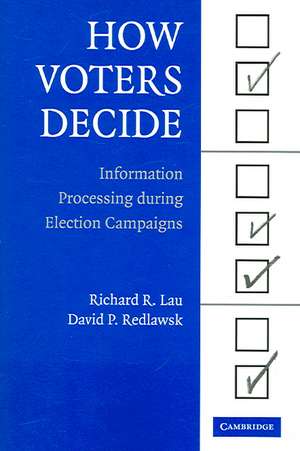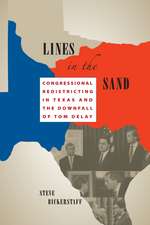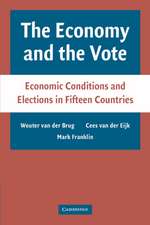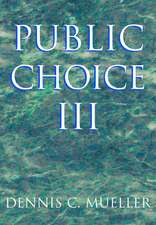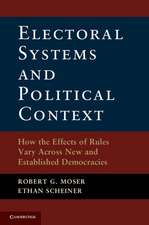How Voters Decide: Information Processing in Election Campaigns: Cambridge Studies in Public Opinion and Political Psychology
Autor Richard R. Lau, David P. Redlawsken Limba Engleză Paperback – 25 iun 2006
| Toate formatele și edițiile | Preț | Express |
|---|---|---|
| Paperback (1) | 271.98 lei 6-8 săpt. | |
| Cambridge University Press – 25 iun 2006 | 271.98 lei 6-8 săpt. | |
| Hardback (1) | 706.15 lei 6-8 săpt. | |
| Cambridge University Press – 25 iun 2006 | 706.15 lei 6-8 săpt. |
Din seria Cambridge Studies in Public Opinion and Political Psychology
-
 Preț: 166.99 lei
Preț: 166.99 lei - 14%
 Preț: 694.64 lei
Preț: 694.64 lei -
 Preț: 227.65 lei
Preț: 227.65 lei -
 Preț: 205.84 lei
Preț: 205.84 lei -
 Preț: 267.95 lei
Preț: 267.95 lei -
 Preț: 268.38 lei
Preț: 268.38 lei -
 Preț: 364.26 lei
Preț: 364.26 lei -
 Preț: 223.29 lei
Preț: 223.29 lei -
 Preț: 223.29 lei
Preț: 223.29 lei -
 Preț: 227.45 lei
Preț: 227.45 lei -
 Preț: 226.46 lei
Preț: 226.46 lei -
 Preț: 287.28 lei
Preț: 287.28 lei -
 Preț: 288.25 lei
Preț: 288.25 lei -
 Preț: 263.00 lei
Preț: 263.00 lei -
 Preț: 229.56 lei
Preț: 229.56 lei -
 Preț: 287.87 lei
Preț: 287.87 lei - 11%
 Preț: 556.32 lei
Preț: 556.32 lei -
 Preț: 286.89 lei
Preț: 286.89 lei -
 Preț: 225.20 lei
Preț: 225.20 lei -
 Preț: 280.91 lei
Preț: 280.91 lei -
 Preț: 201.59 lei
Preț: 201.59 lei - 11%
 Preț: 573.26 lei
Preț: 573.26 lei -
 Preț: 285.75 lei
Preț: 285.75 lei - 11%
 Preț: 554.48 lei
Preț: 554.48 lei -
 Preț: 260.11 lei
Preț: 260.11 lei -
 Preț: 322.89 lei
Preț: 322.89 lei -
 Preț: 384.34 lei
Preț: 384.34 lei -
 Preț: 224.62 lei
Preț: 224.62 lei -
 Preț: 265.11 lei
Preț: 265.11 lei
Preț: 271.98 lei
Nou
Puncte Express: 408
Preț estimativ în valută:
52.05€ • 54.59$ • 43.33£
52.05€ • 54.59$ • 43.33£
Carte tipărită la comandă
Livrare economică 01-15 aprilie
Preluare comenzi: 021 569.72.76
Specificații
ISBN-13: 9780521613064
ISBN-10: 052161306X
Pagini: 366
Ilustrații: 16 tables
Dimensiuni: 152 x 229 x 21 mm
Greutate: 0.5 kg
Editura: Cambridge University Press
Colecția Cambridge University Press
Seria Cambridge Studies in Public Opinion and Political Psychology
Locul publicării:New York, United States
ISBN-10: 052161306X
Pagini: 366
Ilustrații: 16 tables
Dimensiuni: 152 x 229 x 21 mm
Greutate: 0.5 kg
Editura: Cambridge University Press
Colecția Cambridge University Press
Seria Cambridge Studies in Public Opinion and Political Psychology
Locul publicării:New York, United States
Cuprins
Part I. Theory and Methods: 1. Introduction; 2. A new theory of voter decision making; 3. Studying voting as a process; 4. What is correct voting?; Part II. Information Processing: 5. What voters do - a first cut; 6. Individual differences in information processing; 7. Campaign effects on information processing; Part III. Politics: 8. Evaluating candidates; 9. Voting; 10. Voting correctly; 11. Political heuristics; Part IV. Conclusion: 12. A look back, and a look forward; Part V. Appendices and References.
Recenzii
"How Voters Decide: Information Processing during Election Campaigns is a major contribution to our understanding of voting behavior, decision making, and political psychology. Richard Lau and David Redlawsk have employed an innovative methodology to investigate the processes by which voters make sense of the enormous flow of information in a election campaign. The research is carefully designed and analyzed and the results yield insights into mechanisms of political information processing that are normally hidden from view by the standard research methods used in political science. This research shows how the strategies that people use to process information affect the electoral decisions they make and, ultimately, the extent to which elections truly represent the interests of voters." Stanley Feldman, Stony Brook University
"This innovative and exciting book sheds new light on the mysterious process at the heart of democracy: how voters choose among candidates. Lau and Redlawsk develop a range of new techniques to illuminate the otherwise hidden process of candidate choice with consistently interesting and often unexpected results." Martin Gilens, Princeton University
"This book is potentially a landmark in the history of voting behavior research. It takes on the whole structure of theory about voting in virtually all its aspects, about as wide-ranging as The American Voter of 40 years ago, and does so with unusual quality." James Stimson, University of North Carolina, Chapel Hill
"The authors have provided a fresh, innovative perspective...for graduate students, faculty and researchers in political science. it is required reading. Highly recommended." -- Choice
"This book will be of interest to political scientists and cognitive psychologists for its innovative methodology." PsycCritiques
"Anyone committed to understanding voter behavior should read this book, which integrates many years of research. How Voters Decide offeres a novel approach to studying voter cognition, and it yields provocative and detailed findings about memory, heuristics, and decision making that go far beyond this brief review." - John Gastil, University of Washington
"How Voters Decide makes three critical contributions: proposing a process-oriented framework, testing this framework, using a dynamic information environment, and outlining a variety of findings that raise critical questions for future research." - Samuel J. Abrams, Harvard University
2007 Outstanding Academic Title -- Choice Magazine
"This innovative and exciting book sheds new light on the mysterious process at the heart of democracy: how voters choose among candidates. Lau and Redlawsk develop a range of new techniques to illuminate the otherwise hidden process of candidate choice with consistently interesting and often unexpected results." Martin Gilens, Princeton University
"This book is potentially a landmark in the history of voting behavior research. It takes on the whole structure of theory about voting in virtually all its aspects, about as wide-ranging as The American Voter of 40 years ago, and does so with unusual quality." James Stimson, University of North Carolina, Chapel Hill
"The authors have provided a fresh, innovative perspective...for graduate students, faculty and researchers in political science. it is required reading. Highly recommended." -- Choice
"This book will be of interest to political scientists and cognitive psychologists for its innovative methodology." PsycCritiques
"Anyone committed to understanding voter behavior should read this book, which integrates many years of research. How Voters Decide offeres a novel approach to studying voter cognition, and it yields provocative and detailed findings about memory, heuristics, and decision making that go far beyond this brief review." - John Gastil, University of Washington
"How Voters Decide makes three critical contributions: proposing a process-oriented framework, testing this framework, using a dynamic information environment, and outlining a variety of findings that raise critical questions for future research." - Samuel J. Abrams, Harvard University
2007 Outstanding Academic Title -- Choice Magazine
Notă biografică
Descriere
This 2006 book proposes a new framework for studying voter decision making.
